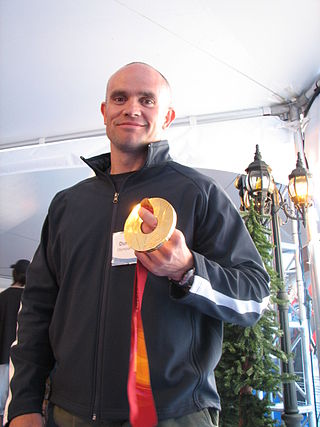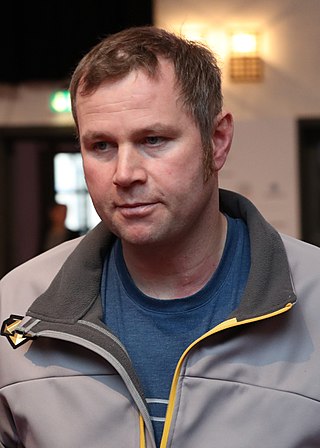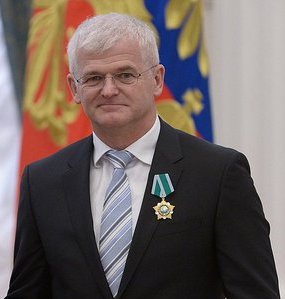
James Edmound Shea Jr. is an American skeleton racer who won the gold medal at the 2002 Winter Olympics in Salt Lake City.

Bobsleigh or bobsled is a winter sport in which teams of 2 to 4 athletes make timed runs down narrow, twisting, banked, iced tracks in a gravity-powered sleigh. International bobsleigh competitions are governed by the International Bobsleigh and Skeleton Federation.

Skeleton returned to the program of the Winter Olympic Games for the first time in 54 years at the 2002 Games in Salt Lake City, Utah. This was the first time Olympic competitions in skeleton were held during an Olympics outside of St. Moritz. Both men and women competed, with women competing for the first time in Olympic history. Medals were awarded after five runs down the course. Both events were contested on February 20.

Skeleton is a winter sliding sport in which a person rides a small sled, known as a skeleton bobsled, down a frozen track while lying face down and head-first. The sport and the sled may have been named from the bony appearance of the sled.

Sledding, sledging or sleighing is a winter sport typically carried out in a prone or seated position on a vehicle generically known as a sled, a sledge (British), or a sleigh. It is the basis of three Olympic sports: luge, skeleton and bobsledding. When practised on sand, it is known as a form of sandboarding. In Russia sledges are used for maritime activities including fishing and commuting from island to island on ice.

Duff Gibson is a Canadian skeleton racer who competed from 1999 to 2006. He was born in Vaughan, Ontario. His father was born on December 13, 1937. At the 2006 Winter Olympics in Turin, He won the gold medal in the men's skeleton, narrowly beating out his teammate Jeff Pain. With his victory, the 39-year-old Gibson surpassed ice hockey player Al MacInnis as the oldest gold medalist in Canadian Winter Olympic history. More significantly, Gibson became the oldest individual gold medallist in the history of the Winter Games, a record previously held by Norway's Magnar Solberg, who was 35 when he won the gold medal in the 20 km individual biathlon event at the 1972 Winter Olympics in Sapporo; he held the record until Ole Einar Bjørndalen won gold at the 10 km biathlon sprint aged 40 at the 2014 Sochi Olympics. He retired immediately following the 2006 Games in Turin.
Frank Kleber is a German skeleton racer who has competed since 2000. He won two medals at the FIBT World Championships with a gold in 2007 and a bronze in 2004.

Gregor Stähli is a Swiss skeleton racer who has competed since 1989. He won two bronze Winter Olympic medals in the men's skeleton, earning them in 2002 and 2006.
Kristan Bromley is a retired British skeleton racer who has competed since 1996. He won the gold medal in the men's event at the 2008 FIBT World Championships in Altenberg, Germany. This was Great Britain's first gold medal at the FIBT World Championships since 1965.
Chris Soule is an American skeleton racer who competed from 1993 to 2006. He won two medals in the men's skeleton event at the FIBT World Championships with a silver in 2003 and a bronze in 1997. Soule also won the overall men's 2002–3 Skeleton World Cup title with multiple World Cup victories that season. He is the 3-time U.S. National Champion and remains one of the most decorated Skeleton athletes in the history of the sport.

Skeleton is a winter sport featured in the Winter Olympics where the competitor rides head-first and prone on a flat sled. It is normally run on an ice track that allows the sled to gain speed by gravity. It was first contested at the 1928 Winter Olympics in St. Moritz and again in 1948 Winter Olympics, after which it was discontinued as an Olympic sport.

Gerhard Plankensteiner is an Italian former luger who competed from 1986 to 2010. Together with Oswald Haselrieder he won the bronze medal in the men's doubles event at the 2006 Winter Olympics in Turin.

Alexander Resch is a German former luger who competed from 1998 to 2010. Together with Patric Leitner, he won the men's doubles event at the 2002 Winter Olympics in Salt Lake City. They also competed at the 2006 Winter Olympics, finishing sixth. At their last race at the 2010 Winter Olympics in Vancouver, they won bronze.

Patric-Fritz Leitner is a German former luger who competed from 1998 to 2010. Together with Alexander Resch he won the men's doubles event at the 2002 Winter Olympics in Salt Lake City. They also competed at the 2006 Winter Olympics, finishing sixth. At the 2010 Winter Olympics in Vancouver, they won bronze in their last race.
The IBSF World Championships, part of the International Bobsleigh and Skeleton Federation, have taken place on an annual basis since 1930. Starting with 2002, no World Championships being held in non-Winter Olympic years. A two-man event was included in 1931 with a combined championship occurring in 1947. Men's skeleton was introduced as a championship of its own in 1982 while women's bobsleigh and skeleton events were introduced in 2000. Both the women's bobsleigh and skeleton events were merged with the men's bobsleigh events at the 2004 championships. A mixed team event, consisting of one run each of men's skeleton, women's skeleton, 2-man bobsleigh, and 2-women bobsleigh, was held from 2007 to 2019. In 2020 it was replaced with skeleton mixed team event, consisting of one run each of men's and women's skeleton. Women's monobob event was included in 2021.
Christian Auer is an Austrian skeleton racer who competed from the late 1980s to the 2002 Winter Olympics. He won five medals in the men's event at the FIBT World Championships with one gold (1991), two silvers, and two bronzes.

Wilfried "Willi" Schneider is a German skeleton racer who competed from 1992 to 2002. He won two medals in the men's skeleton event at the FIBT World Championships with a gold in 1998 and a bronze in 1999.

Clifton Hugh Lancelot de Verdon Wrottesley, 6th Baron Wrottesley is an Irish and British peer and Conservative member of the House of Lords. He represented Ireland in men's skeleton at the 2002 Winter Olympics, finishing fourth.

Frank Rommel is a German retired skeleton racer who began competing internationally in 2002. He won two medals at the FIBT World Championships with a gold in the mixed team (2009) and a bronze in the men's skeleton event 2008.















